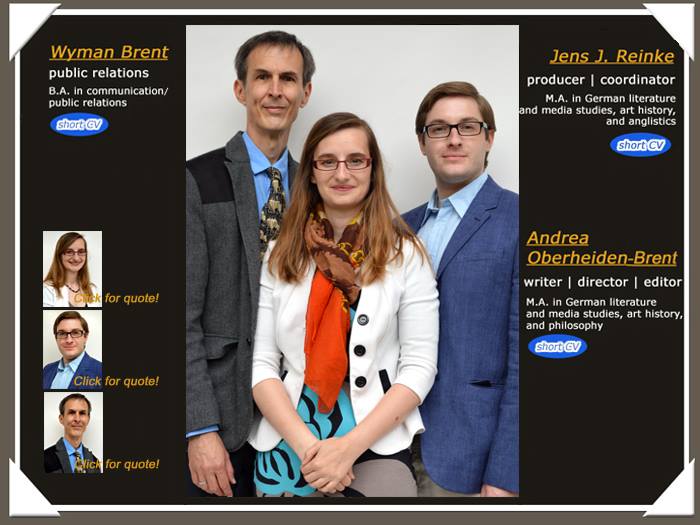Publications: Jens Reinke
Independent release:
AJ-Images Magazine: Arts and Culture | Film, Theater, Literature
AJ-Images Magazine will be published as a free online magazine which can be downloaded from this website. Each issue will feature articles about certain artists or pieces of art from the fields of film, theater, and literature. Various writers from different backgrounds will contribute their insights.
The first issue will contain articles and interviews related to Al Jolson and his times. Furthermore, it will provide a huge amount of background information from our research activities for our feature Jolson documentary that otherwise would be lost... (more)
AJ-Images Magazine Issue #1 | 2010: Al Jolson
Articles:
The Glenn Miller Story
Der Film verfolgt das Leben des Jazzmusikers und späteren Bandleaders Glenn Miller. Zunächst wird er als armer Künstler dargestellt, der häufiger im Pfandleihhaus als auf der Bühne ist. Motiviert durch seinen Freund reist er nach New York, wo er ein Engagement am Broadway erhält. Auf dem Weg trifft er sich mit seiner unglücklich in einen anderen Mann verlobten Ex-Freundin, die er später nach New York holt und zügig und sehr zu ihrer Ãśberraschung heiratet. Das Paar lebt in New York und Miller besucht dort verschiedene Jazz Clubs, um Inspirationen zu gewinnen, ständig auf der Suche nach einem eigenen Sound. Seine Frau motiviert und unterstützt ihn, so dass er schlieÃźlich mit seiner eigenen Band ein Engagement in Boston annimmt. Ein Schneesturm verhindert jedoch, dass der pünktlich ist. Zudem wird Millers Ehefrau krank, seine Band zerbricht... (more)
In: Kieler Beiträge zur Filmmusikforschung 2, 2008, S. 166–170.
University assignments:
Hamlet – From the Ghost to the Ãśbermensch
An approach to the famous quote: ''There are more things in heaven and earth, Horatio, / Than are dreamt of in our philosophy''
Quoted numerous times, within and outside its original context, Hamlet's famous lines ''There are more things in heaven and earth, Horatio, / Than are dreamt of in our philosophy'' (Hamlet, 1.5.168-169) never stop fascinating us. The function of this essay is to show how these lines work in their specific context and which tasks they fulfill in terms of larger issues within the play. The essay attempts to show and explain not only the contextual workings of Hamlet's lines, but also their larger philosophical, mythological, and religious allusions... (more)
First short essay, Harvard University Extension School, Shakespeare and Modern Culture, grade: A
Shakespeare – Passage identifications, short answers, and short essay about Hamlet
X: Nay, but hear me. Pardon this fault, and by my soul I swear I never more will break an oath with thee.
Y: I once did lend my body for his wealth, Which but for him that had your husband's ring Had quite miscarried. I dare be bound again, My soul upon the forfeit, that your lord Will ne'er more break faith advisedly.
Z: Then you shall be his surety: give him this, And bid him keep it better than the other... (more)
Midterm exam, Harvard University Extension School, Shakespeare and Modern Culture, grade: A–
Hamlet's speech on playacting
Hamlet's famous speech on playacting provides a core of ideas for thinking about the dilemma he faces and the courses of action - or inaction - available to him. Discuss HAMLET's treatment of acting (in all its senses); other key terms for your thinking might be memory, humanness and interiority, loss and grief, or truth and falsehood, but you should feel free to frame your discussion in ways that you find to be fruitful and compelling... (more)
Midterm essay, Harvard University Extension School, Shakespeare and Modern Culture, grade: A
Short thoughts on Shakespeare – double plot, Othello, Macbeth, The Tempest, Hamlet, and The Merchant of Venice
Shakespeare often makes use of what we might call 'double plot' structure, in which one plotline or complex of situations mirrors, or comments upon, or reinterprets events that transpire in other dramatic situations. Often this takes the form of relatively minor characters and plotlines doubling events and situations from the 'main' dramatic narrative. How and where have you found this to occur in one of the texts we have read so far? (more)
Final exam, Harvard University Extension School, Shakespeare and Modern Culture, grade: B
'Fit to govern?' Macduff's bewildered question looms heavily over all of MACBETH
Using no fewer than three characters from that play, discuss the idea of 'fitness to govern.' What are the criteria of such fitness? How do characters in MACBETH show, or fail to show, such qualification? (more)
Final exam essay (short), Harvard University Extension School, Shakespeare and Modern Culture, grade: B



